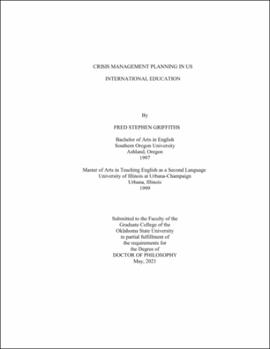| dc.contributor.advisor | Wanger, Stephen | |
| dc.contributor.author | Griffiths, Fred Stephen | |
| dc.date.accessioned | 2021-09-23T19:42:45Z | |
| dc.date.available | 2021-09-23T19:42:45Z | |
| dc.date.issued | 2021-05 | |
| dc.identifier.uri | https://hdl.handle.net/11244/330844 | |
| dc.description.abstract | Purpose: This dissertation informs the state of crisis management planning in US international education and its impact on managing crises during a pandemic. | |
| dc.description.abstract | Objective: The objective of this empirical study was to inform the current state of crisis management planning in US international education. It also examines if there are significant group differences in the level of preparedness, management of a pandemic, and impact of a pandemic. Finally, it attempts to determine if there is a positive relationship between level of involvement in crisis management planning and the time to recovery. | |
| dc.description.abstract | Key results: The results revealed that while 82.9% of institutions had an institutional CMP, only 47.1% of international divisions were involved or considered in the development of those plans. Data also revealed that 50.9% of international divisions had their own separate written CMP with the average review of the plan occurring every 1-5 years. Contingency planning data showed that 35% of institutions had written step-by-step instructions on how to respond to a crisis. Finally, data showed that there was no significant group difference in preparedness, management, or impact nor an increase to recovery time based on the international department's level of involvement in CMP development. | |
| dc.description.abstract | Conclusion: The results of this study show that many international departments are not engaged in crisis management planning at either the institutional or departmental level. This suggests that international offices are responding to crisis and would benefit from crisis management planning. Results also showed that crisis management planning had no impact on preparedness, management, impact, or time to recovery during a pandemic. This was not surprising as it is nearly impossible to prepare for crises that emerge during such an event (Taleb, 2007). | |
| dc.format | application/pdf | |
| dc.language | en_US | |
| dc.rights | Copyright is held by the author who has granted the Oklahoma State University Library the non-exclusive right to share this material in its institutional repository. Contact Digital Library Services at lib-dls@okstate.edu or 405-744-9161 for the permission policy on the use, reproduction or distribution of this material. | |
| dc.title | Crisis management planning in US international education | |
| dc.contributor.committeeMember | Matlock Cole, Ki | |
| dc.contributor.committeeMember | Manning-Ouellette, Amber | |
| dc.contributor.committeeMember | Asino, Tutaleni | |
| osu.filename | Griffiths_okstate_0664D_17089.pdf | |
| osu.accesstype | Open Access | |
| dc.type.genre | Dissertation | |
| dc.type.material | Text | |
| dc.subject.keywords | crisis management | |
| dc.subject.keywords | global education | |
| dc.subject.keywords | higher education | |
| dc.subject.keywords | international education | |
| thesis.degree.discipline | Educational Leadership and Policy Studies | |
| thesis.degree.grantor | Oklahoma State University | |
